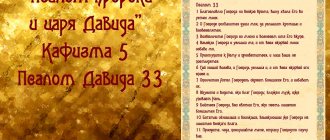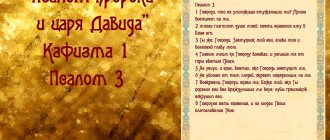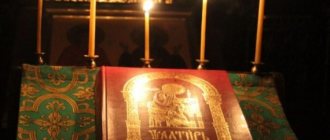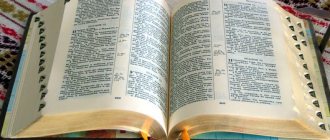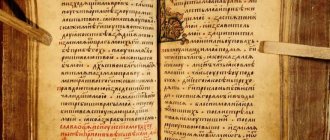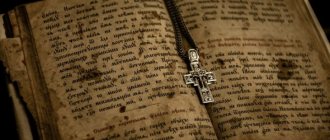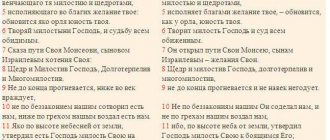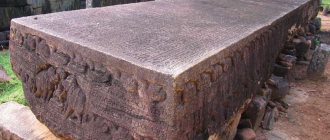The text of Psalm 33 is a special song of praise that was written long ago by King David himself. They say that he feigned madness in order to escape from another ruling king named Achish. The text seemed to cleanse David of everything he had ever done, protected his soul from bad intentions, and shed light.
About the author About the book
Today, the singing of psalms is a teaching about the spiritual, that the Gospel ministry is very important for humanity. Therefore, if a believer wants to live in harmony, understanding and long life, in goodness and warmth, then Psalm 33 is a must-read.
History of writing
David came to power after using cunning to save Israel from the cruel King Goliath. However, David had an envious person - King Saul, who was his son-in-law. After Saul began persecuting his father-in-law, David had to hide, because certain death awaited him. The future ruler wanted to hide among the Philistines, but the people seized the fugitive and brought him to Abimilech for trial.
David realized that he would not be able to avoid death, so he played the crazy man perfectly. Abimilech refused to believe that this crazy man was a hero, so he kicked him out along with his servants.
After his sudden deliverance from death, the king wrote a text for the psalter in which he says “I will bless the deeds of the Lord and thank him for saving my life.”
Psalm 33 is included in the fifth kathisma
Orthodox Life
Liturgy is the immeasurable depth and mystery of the life of the Holy Spirit in man. It has a lot of symbols, meanings, meanings.
And one of them, it seems to me, is that at the Liturgy there is a dialogue between God and man. During the Eucharistic canon, when the Holy Spirit transforms bread, wine and water into the Body and Blood of Christ, we can say that the Lord speaks to man. This also applies to the communion of believers, which symbolizes the Resurrection of Christ. The Savior rose from the dead and through the Holy Eucharist resurrects us from the death of sin.
And after communion, when the priest brings the Chalice into the altar, another part of the Liturgy begins, in which man (humanity) already speaks with God. And the main theme of this conversation is thanksgiving to the Almighty for all the blessings that He sends us, especially for the salvation of humanity from the slavery of sin, death and hell through the Redemptive Labor of our Lord Jesus Christ, which, in fact, is the essence of the Divine Liturgy. Salvation, deification, the closest possible union of God and man take place precisely on it, at a time when man, with the fear of God and faith, approaches the Holy Mysteries of Christ.
For which we thank the Lord.
And here the singing of the 33rd Psalm is very appropriate. It is preceded by the reading of the prayer behind the pulpit by the priest, which begins and ends with thanksgiving to God: “Blessing those who bless Thee, O Lord, and sanctifying those who trust in Thee... For every gift given is good, and every gift perfect is from above, coming down from Thee, the Father of lights; and to You we send glory, and thanksgiving, and worship, to the Father and the Son and the Holy Spirit, now and ever and unto ages of ages.”
The priest begins thanksgiving as an intercessor and prayerful representative before God for the people. And then the choir, on behalf of all Orthodox Christians in the world, enters into the prayer of the clergyman, uniting with it in a single glorification of thanksgiving to the Lord.
After the prayer behind the pulpit, the choir says “Amen,” that is, “truly so,” “so be it,” and then sings three times to the glory of the Holy Trinity this beautiful hymn of praise to God, “Blessed be the name of the Lord from now on and forever,” followed by follows the 33rd Psalm.
The writing of this psalm has its own history. In the Psalter it is inscribed as follows: “A Psalm to David, ever change your face before Abimelech and let him go, and go away,” in the Russian translation “A Psalm of David, when he pretended to be mad before Abimelech and was driven out of him and withdrew.” This story is told in the First Book of Kings of the Old Testament (21:10–15). Here Abimelech is called Achish, king of Gath. Gath is one of the cities of the Philistines, a people who neighbored the Jews in the Promised Land. The Jews often fought with the pagan Philistines. St. Basil the Great tells us about the difference between the names of the Psalter Abimelech and the First Book of Kings Achish. The fact is that Abimelech is not a name, but a general title of the Philistine kings, just as the Egyptian kings were called pharaohs. The Philistine kings, in addition to this general title, also had their own names, as was the case with Achish.
Now about why the holy prophet and king David wrote the 33rd Psalm in a historical sense.
He found himself between a rock and a hard place. On the one hand, he was persecuted by the Jewish king Saul and was forced to find himself in the territory controlled by the Philistine king Achish, on the other hand, Achish was the king of Gath, and it was from this city that Goliath came, whom David defeated in a fair battle, which became decisive in the battle between the Jews and the Philistines . This battle ended in victory for the Jews. Therefore, the holy prophet knew that Achish would want to take revenge on him for the shame of the Philistine people and, most likely, would kill him. But David was still forced to enter the lands of Gath, fleeing from Saul. To prevent Abimelech from touching him, David feigned madness, and Achish released the saint.
After his miraculous salvation, David, seeing in this the Providence of God and the help of the Almighty, Who delivered him from the hands of the wicked king, wrote a wondrous thanksgiving to the Lord, known to us as the “33rd Psalm.” Now this psalm, especially at the Liturgy, has an Easter universal meaning for us: God, through His Redemptive Feat, delivered humanity from the slavery of the devil, sin and eternal death. And one of the main Divine ways of saving humanity is the Holy Eucharist. For which we will never tire of thanking God!
“I will bless the Lord at all times; I will bring His praise into my mouth,” - this is the first verse of this psalm. The Church Slavonic word “vynu” here means “incessantly.” I will continually bless and thank the Lord. And in this prayer at the Liturgy, humanity merges with the angelic unceasing praise of God. The Heavenly Church and the Earthly Church are united by the Holy Spirit and God’s love for us and our love for God. That's why we are alive!
“I will bless the Lord at all times; I will make His praise in my mouth...”
Priest Andrey Chizhenko
Interpretation and meaning of Psalm 33
Today you can read chants in Church Slavonic and Russian. You can even find the latest translations that have the accents. However, no matter what translation you read, the meaning of the prayer remains the same.
Pay attention to the main ideas of the psalm to interpret its meaning:
- God must be praised for all the good deeds that a person does, since this is the merit of the Almighty;
- everyone needs to strive for unity with the Creator, because in this way one can gain wisdom and know the truth;
- those who oppose the righteous will receive in full from the Angel of the Lord;
- God's people are distinguished from the Gentiles, and the Jewish people are called hungering for the Lord;
- sinners need to know God's teaching and also not condemn anyone;
- all people need to deviate from evil deeds and not forget that the eyes of the Almighty are righteous;
- The Lord preserves all human virtues, including temperance and piety.
The meaning of Psalm 33
The prayer exists in several translations; they retain one meaning, which can be understood by delving into the interpretation of individual verses:
- Verse 1 to 3 - everything that a person owns is the merit of God, therefore the righteous need to praise Him diligently, constantly;
- Verse 4 - the psalmist calls on people to follow his example, exalt the One Creator;
- Verse 5 to 7 – The Lord will help those who recognize His wisdom, who ask for help, as David does;
- Verse 8 - according to the will of God, the righteous receive His protection, and the wicked receive punishment;
- Verse 9 – the prophet insists that everyone should know the Lord and be imbued with His truth;
- Verses 10 and 11 - those who know the Savior are not afraid of troubles;
- Verse 12 to 15 - the author talks about the importance of the teachings of the Almighty;
- Verse 16 to 18 – God protects the righteous, but does not listen to the words of sinners;
- Verse 19 to 21 – salvation awaits those who believe in Christ;
- Verse 22 – the enemies of the righteous, the sinners will be punished;
- Verse 23 – The Most High will take care of His servants, the righteous.
How and when to read
The time at which a psalm should be sung depends entirely on the desire of the believer. You need to choose a moment when a person is ready to experience harmony, goodness, warmth and become closer to the Almighty. You need to read the text thoughtfully and clearly. Believers claim that after reading the chant, miraculous changes occur in their lives.
Most of the works from the book of Psalms were written by the prophet David
You need to read the Psalter in silence and solitude
Psalm 33 – a song of praise
Text of Psalm 33 in Russian
1 Psalm of David, when he feigned madness before Abimelech and was driven away from him and withdrew.
2 I will bless the Lord at all times; His praise is continually in my mouth.
3 My soul will glory in the Lord; The meek will hear and rejoice.
4 Magnify the Lord with me, and let us exalt His name together.
5 I sought the Lord, and He heard me, and delivered me from all my dangers.
6 Those who looked to Him were enlightened, and their faces were not ashamed.
7 This beggar cried, and the Lord heard and saved him from all his troubles.
8 The angel of the Lord encamps around those who fear Him and delivers them.
9 Taste and see how good the Lord is! Blessed is the man who trusts in Him!
10 Fear the Lord, all you His saints, for there is no want among those who fear Him.
11 The people of Skim are poor and hungry, but those who seek the Lord lack no good thing.
12 Come, children, listen to me: I will teach you the fear of the Lord.
13 Does a person want to live and does he love long life in order to see good?
14 Keep your tongue from evil and your lips from deceitful words.
15 Avoid evil and do good; seek peace and follow it.
16 The eyes of the Lord are on the righteous, and His ears are on their cry.
17 But the face of the Lord is against those who do evil, to destroy the memory of them from the earth.
18 [The righteous] cry, and the Lord hears, and delivers them from all their troubles.
19 The Lord is close to the brokenhearted and will save those who are humble in spirit.
20 Many are the sorrows of the righteous, and the Lord will deliver him from all of them.
21 He keeps all his bones; not one of them will be crushed.
22 Evil will kill the sinner, and those who hate the righteous will perish.
23 The Lord will redeem the soul of His servants, and none of those who trust in Him will perish.
If you carefully read the psalm and think about every word, it becomes clear why it has gained such fame. The chant is imbued with amazing power, which can only be comprehended during certain periods of life. This psalm is a must-read for everyone who wants to know the deep essence of life and get closer to God.
If you find an error, please select a piece of text and press Ctrl+Enter.
Psalm 33
Psalm 33 - text with emphasis and translation How Psalm 33 was written (history) Explanation and brief interpretation of the psalm
PSALM 33 – TEXT WITH EMPHASIS AND TRANSLATION
Psalm No. 33 (with Glory) listen:
KATHISMA 5
| Psalm 33 | Psalm 33 |
| 1 Psalm to David, sometimes change your face before Abimelech, and let him go, and go away | 1 Psalm of David; when he changed his countenance before Abimelech, and he let him go, and he departed. |
| 2 I will bless the Lord always; I will put His praise in my mouth. | 2 I will bless the Lord at all times; His praise is continually in my mouth. |
| 3 My soul shall glory in the Lord, that the meek may hear and be glad. | 3 My soul will glory in the Lord; The meek will hear and rejoice. |
| 4 Magnify the Lord with me, and let us exalt His name together. | 4 Magnify the Lord with me, and let us exalt His name together. |
| 5 Seek the Lord and hear me, and deliver me from all my troubles. | 5 I sought the Lord, and He heard me, and delivered me from all my dangers. |
| 6 Come to Him and be enlightened, and your faces will not be ashamed. | 6 Those who looked to Him were enlightened, and their faces were not ashamed. |
| 7 This beggar cried, and the Lord heard and saved him from all his troubles. | 7 This beggar cried, and the Lord heard and saved him from all his troubles. |
| 8 The Angel of the Lord will encamp around those who fear Him, and will deliver them. | 8 The angel of the Lord encamps around those who fear Him and delivers them. |
| 9 Taste and see that the Lord is good; Blessed is the man who trusts in Nan. | 9 Taste and see how good the Lord is! Blessed is the man who trusts in Him! |
| 10 Fear the Lord, all you saints, for those who fear Him will have no hardship. | 10 Fear the Lord, all you His saints, for those who fear Him have no want. |
| 11 For riches they become poor and hungry, but those who seek the Lord will not lack any good. | 11 The rich became poor and hungry, but those who seek the Lord will not lack any good thing. |
| 12 Come, children, listen to me, I will teach you the fear of the Lord. | 12 Come, children, listen to me: I will teach you the fear of the Lord. |
| 13 Who is the man who loves the days and sees good things? | 13 Does a person want to live and does he love long life in order to see good? |
| 14 Keep your tongue from evil, and keep your lips from uttering flattery. | 14 Keep your tongue from evil and your lips from deceitful words. |
| 15 Avoid evil and do good. Seek peace and get married. | 15 Avoid evil and do good; seek peace and follow it. |
| 16 The eyes of the Lord are upon the righteous, and His ears are upon their prayer. | 16 The eyes of the Lord are on the righteous, and His ears are on their cry. |
| 17 But the face of the Lord, against those who do evil, shall even consume their remembrance from the earth. | 17 But the face of the Lord is against those who do evil, to destroy the memory of them from the earth. |
| 18 They cried out for righteousness, and the Lord heard them, and delivered them from all their troubles. | 18 The righteous cry, and the Lord hears, and delivers them from all their troubles. |
| 19 The Lord is near to the brokenhearted, and will save the humble in spirit. | 19 The Lord is close to the brokenhearted and will save those who are humble in spirit. |
| 20 Many are the tribulations of the righteous, and the Lord will deliver them from all of them. | 20 Many are the sorrows of the righteous, and the Lord will deliver him from all of them. |
| 21 The Lord guards all their bones, not one of them will be broken. | 21 The Lord guards all their bones; not one of them will be broken. |
| 22 The death of sinners is cruel, and those who hate the righteous will sin. | 22 The death of sinners is evil, and those who hate the righteous will sin. |
| 23 The Lord will redeem the souls of His servant, and all who trust in Him will not sin. | 23 The Lord will redeem the soul of His servants, and none of those who trust in Him will perish. |
Glory:
HOW PSALM 33 WAS WRITTEN AND WHAT IT MEANS
Saving his life, David was forced to hide from his pursuer King Saul (Book of 1 Samuel 21:1-13) in the land of the Philistines. Not long before this, during the war, David killed the strongest Philistine warrior, Goliath, and when he was with them, the Philistines recognized the winner of their hero, grabbed him and led him to the king. Then David pretended to be mad, began to crawl on the ground and drool from his mouth. The king, seeing such a man, did not believe his subjects and ordered the madman to be expelled from the palace. Having thus received salvation, David in a psalm poured out gratitude to God for His mercies towards pious people and sang the teaching about the fear of God, that the wicked will be punished for their sins. The inscription is a psalm of David, when he pretended to be mad before Abimelech and was driven away from him and withdrew. All the Philistine kings were called Abimelich, just as the Roman rulers were called Caesars or the Egyptian rulers were called pharaohs.
EXPLANATION AND BRIEF INTERPRETATION OF PSALM 33
Ps.33:2 I will bless the Lord at all times; I will make His praise in my mouth. I will bless the Lord at all times; His praise is continually in my mouth. To bless means to praise the Lord, i.e. “gratitude for blessings, for God’s mercies.” The meaning of this verse is as follows: in prosperity or in sorrow, I will never stop blessing the Lord, knowing that everything that happens is from God and according to his providence, there are no accidents. I will praise Him unceasingly; I will attribute everything to the glory of the Lord.
Ps.33:3 My soul shall glory in the Lord: let the meek hear and be glad. In the Lord my soul will glory; The meek will hear and rejoice. David understands that it was not he himself who, by his luck and intelligence, was able to escape execution, but God helped him, and therefore thanks Him for this goodness. Next in the psalm there is an appeal to the meek, i.e. to those people who trust in the will of God and do not return evil for evil. David calls on them to rejoice, to rejoice with him, seeing how miraculously he, without fighting, only trusting in the help of the Lord, was saved from trouble. Theophan the Recluse taught: “Cast sorrow upon the Lord, and He will arrange for you everything for which you have neither the strength nor the means.”
Ps.33:4 Magnify the Lord with me, and let us exalt His name together. Magnify the Lord with me, and let us exalt His name together. The magnification and exaltation of God is necessary, first of all, for us, so that we understand with our hearts the depth of His creation - the world, the universe, and from this understanding we ourselves are filled with the triumph of the spirit. David calls on all the meek who love God to share this spiritual joy together (let us lift up His name together).
Ps.33:5 I sought the Lord, and heard me, and delivered me from all my sorrows. I sought the Lord, and He heard me, and delivered me from all my dangers. David did not just seek the Lord, but made efforts (seeks), like a child who has lost his parents seeks relatives. And God heard David calling, but not his voice itself, but his inner call, which came from his very heart. Saul had many opportunities to destroy David, but being under the protection of the Lord, the prophet avoided captivity and death, i.e. sorrows.
Ps.33:6 Come to Him and be enlightened, and your faces will not be ashamed. Those who turned their gaze to Him were enlightened, and their faces would not be ashamed. Those who believe and love (approach) the Lord will receive God’s grace and enlightenment. After all, those people who have some kind of trouble usually have a sad, mournful appearance, and after they come under God’s protection, sorrows go away and sadness and troubles recede from a person, and his face is not ashamed in trusting in God.
Ps.33:7 This poor man cried out, and the Lord heard and saved him from all his troubles. This beggar cried out, and the Lord heard and saved him from all his troubles. This beggar is what David calls himself. He was then in exile, in need, without shelter, relatives and friends. Any person in trouble can be called a beggar, and he does not need to despair, he must call on God - He will definitely hear and help. There are a huge number of such examples in history, and in the life of every person, if you are careful, there are examples of God’s protection. A beggar is not someone who has no money. Poor and blessed are those who have the Lord and love for Him in the first place in their hearts, and then everything else.
Ps.33:8 The angel of the Lord will encamp around those who fear Him and will deliver them. After baptism, the Lord gives each person a guardian angel who protects him, unless, of course, he himself drives away the angel with his evil deeds. Those who fear God and try not to sin are protected by the angel from external troubles and dangers.
Ps.33:9 Taste and see that the Lord is good: blessed is the man who trusts in Nan. Taste and see how good the Lord is! Blessed is the man who trusts in Him. David calls - try (taste) yourself and make sure that those who trust in the Lord, pray earnestly to Him, will receive confirmation of the goodness of God to those who resort to Him. Blessed is the one who trusts in God, because he will certainly receive help. The blessed and the poor always carry within themselves love for God, for the world, they have no evil in their hearts. Those who trust in the Lord endure any trials much calmer than those who do not have faith. They do not lose heart, rightly considering everything that happens to be God’s providence.
Ps.33:10 Fear the Lord, all your saints, for there is no hardship for those who fear Him. Fear the Lord, all you His saints, for there is no poverty among those who fear Him. The psalmist calls everyone who believes in God saints. We need to live godly and never forget the fear of God. We must remember the danger that our sins may offend the holiness of the Lord. Those who fear the Lord need not fear difficulties or even hardships. Sustained by the grace of the Holy Spirit, they receive spiritual benefits that are immeasurably higher than all treasures - those who fear God have no deprivation.
Ps.33:11 With riches they become poor and hungry: but those who seek the Lord will not be deprived of any good. The rich became poor and began to starve, but those who seek the Lord will not tolerate the need for any good. Here the word “rich” refers to arrogant people who trust in their own strength and power rather than in God. Throughout their lives, they accumulate wealth in various ways, including dishonest ones, sometimes even more than they need. During accumulation, they develop a passion for covetousness, which leads to fear of losing treasures and position in society. Often, by the will of God, they lose their savings, but even if the Lord does not deprive them of their wealth, such people are rarely satisfied with life because of their fears. There are cases when such rich people “sit on bags of money,” but because of stinginess, they lead a miserable lifestyle. In contrast, the psalmist speaks of those who seek (seek) the Lord. Such people, even if they are in poverty by earthly standards, actually live easily, there is love for the Lord in their hearts, it helps them painlessly endure all the difficulties and sorrows of life.
Ps.33:12 Come, children, listen to me, I will teach you the fear of the Lord. The prophet, as a teacher, calls to learn the most important thing that leads to the love of God - the fear of the Lord. But this is not the same as fear (fear) of the enemy or demons. The fear of God among true believers lies in the fear of losing the love and protection of the Lord.
Ps.33:13 Who is a man, though he may love the days and see good things? Does a person want to live and does he love long life in order to see good? In other words: who wants to live and likes to see prosperity? According to the teaching of the holy fathers, in this verse, in addition to earthly life, one must understand the life of the next century. A belly means a healthy, happy life.
Ps.33:14-15 Keep your tongue from evil and your lips from uttering flattery, turn away from evil and do good: seek peace and marry. Keep your tongue from evil and your lips from deceitful words. Avoid evil and do good; seek peace and follow it. These two verses provide guidance for a happy life. The prophet points out that in addition to the obvious evil that a person can create with the help of the tongue, there is also flattery, sweet speech, which hides behind itself deceit, lies and cunning (restrain your lips from speaking flattery). It is a great sin when a person, using trust, learns all the secrets, and then, with the help of this information, brings harm to the person who trusted him. But it is not enough to receive the Kingdom of God as a reward by avoiding evil; it is also necessary to do everything opposite to evil; instead of pride, one must be humble, instead of laziness, hardworking; anger and rancor must be opposed to meekness. And there is no need to respond to evil that comes from others with evil; it would be more correct to repay with good. In this way one can find a peaceful and tranquil life (seek peace). And get married and - i.e. pursue, follow goodness, peace, seek these virtues.
Ps.33:16-17 The eyes of the Lord are upon the righteous, and His ears are upon them in prayer The face of the Lord is upon those who do evil, who destroy their remembrance from the earth. The eyes of the Lord are on the righteous, and His ears are on their cry. But the face of the Lord is against those who do evil, to destroy the memory of them from the earth. All those people who move away from evil, lies and hypocrisy, who do good, who live a righteous life, are under the protection of God because He always turns His gaze to them, hears them and protects them, protects them from troubles. The Lord also looks at the wicked and evil and does things to destroy their memory, to forget their sinful deeds. There are examples of this in history: the extermination of sinners in the Flood, the destruction of the inhabitants of Sodom and Gomorrah, etc.
Ps.33:18 The righteous cried, and the Lord heard them, and delivered them from all their sorrows. The righteous cry, and the Lord hears, and delivers them from all their sorrows. But, if it happens that prayers do not help, this means you need to be patient, everything will work out. After all, the Lord and His actions are incomprehensible to our minds.
Ps.33:19-20 The Lord is near to the brokenhearted, and will save the humble in spirit. Many are the sorrows of the righteous, and the Lord will deliver me from all of them. The Lord is close to the brokenhearted and will save the humble in spirit. The righteous has many sorrows, and the Lord will deliver him from all of them. The psalmist reassures the righteous that the Lord is always nearby, covering with His right hand from enemies. The righteous, even in difficult trials, never grumble about life or God; they humbly accept everything that happens to them. The Lord helps them even in sorrows, giving them strength and patience, and in the end, they receive a reward for their perseverance and love for God.
Ps.33:21 The Lord guards all their bones, not one of them will be broken. Although the righteous pass into eternal life with their souls, their body will also be incorruptible and preserved. There are many cases in history when, during the reburial of the remains of saints, their bodies, upon opening the graves, were found intact and incorrupt. The Lord shows us such miracles to glorify the righteous and as another proof of His power, which is incomparably higher than any laws of nature. In a spiritual sense, the holy fathers explain this verse to us in such a way that the righteous always maintain their good disposition, despite any sorrows and trials.
Ps.33:22 The death of sinners is cruel, and those who hate the righteous will sin. Sinners, unlike righteous people. A completely different fate awaits. Atheists believe that all suffering ends with the death of a person, and beyond death there is emptiness, but this is not so, in fact, everything is just beginning. David prophesies that sinners, at the hour of death, will see their destruction and will be horrified by what they have done in their earthly life, but it will be impossible to correct anything. Upon death, demonic forces take their souls and send them to torture, where they are left to await the Last Judgment. During earthly life, the wicked considered the righteous to be backward people, humiliated and insulted them with words and deeds. Everything changes after death, and then those who hate the righteous will sin, they will understand that they spent their lives in vain, but it will be too late.
Ps.33:23 The Lord will redeem the souls of His servant, and all who trust in Him will not sin. The Lord will deliver the soul of His servants, and none of those who trust in Him will perish. The Lord will free from sorrow all who trust in Him, take all those who love Him and place them in heavenly bliss. There, after death, the theory of hope for salvation will turn into practice, into reality, the righteous there will fully feel, see, touch what they believed in here.
Thus, through the entire psalm, the prophet calls on us so that we do not sin, be virtuous, and then we will receive the Kingdom of Heaven as a reward!
